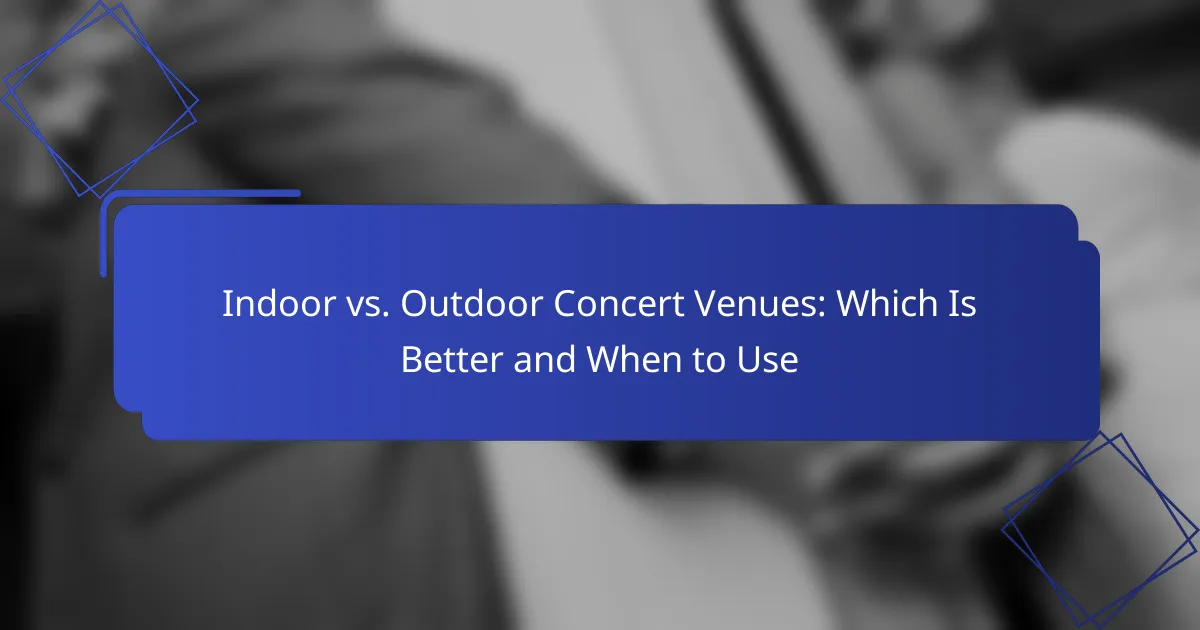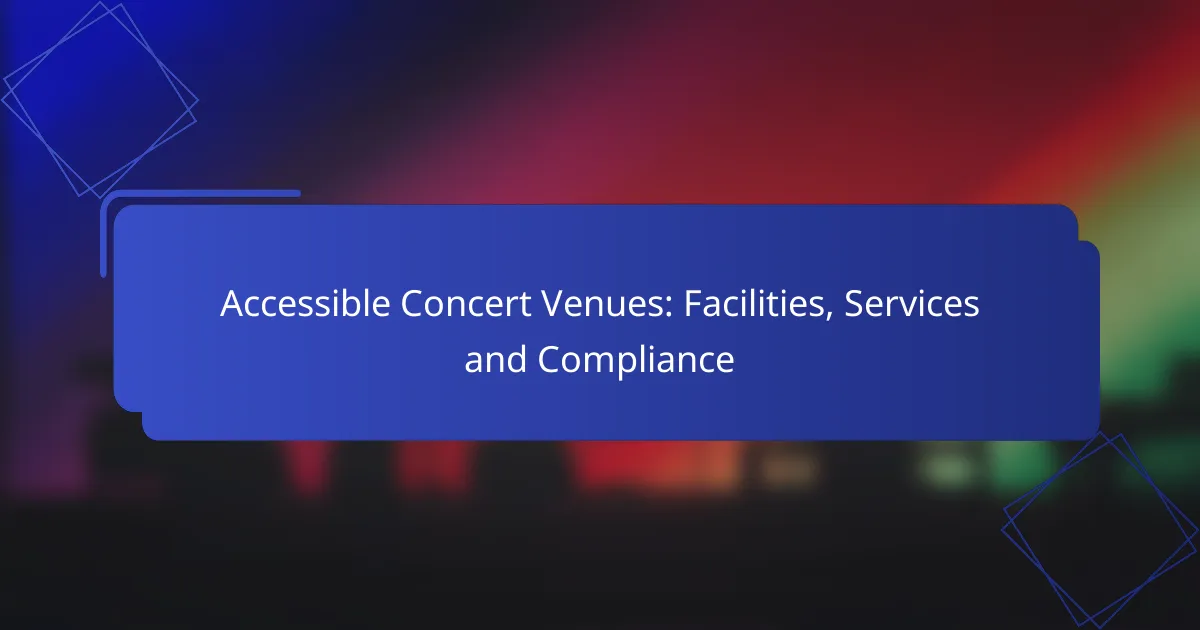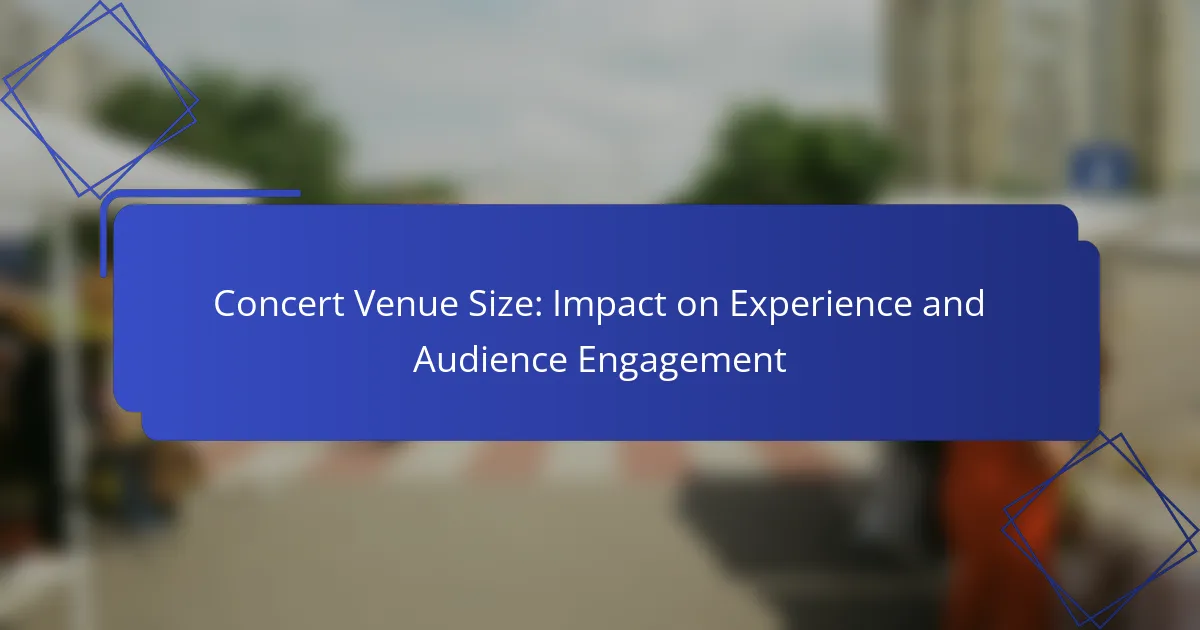Choosing between indoor and outdoor concert venues involves considering various factors that can significantly impact the experience for both performers and attendees. Indoor venues provide a controlled environment with optimized acoustics, making them ideal for intimate performances or when weather conditions are unpredictable. In contrast, outdoor venues offer a natural setting and the capacity for larger crowds, making them perfect for festivals and open-air events. Understanding these advantages can help you select the best venue for your concert needs.
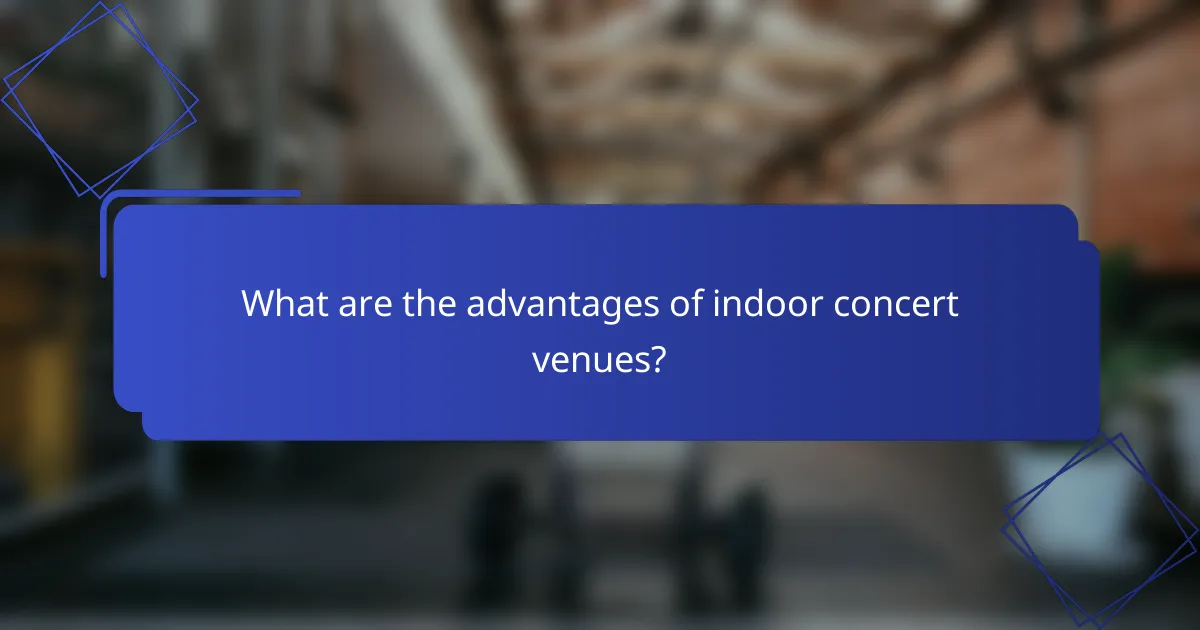
What are the advantages of indoor concert venues?
Indoor concert venues offer several advantages, including a controlled environment, optimized acoustics, and independence from weather conditions. These factors can significantly enhance the overall concert experience for both performers and attendees.
Controlled environment
Indoor venues provide a stable climate, allowing for consistent temperature and humidity levels. This control helps ensure that both the audience and performers are comfortable throughout the event, which can be particularly important during longer performances.
Additionally, the absence of external distractions, such as noise from traffic or wildlife, allows for a more immersive experience. Venues can also be equipped with advanced lighting and staging technology, further enhancing the atmosphere.
Acoustic optimization
Indoor concert venues are often designed with acoustics in mind, featuring materials and layouts that enhance sound quality. This optimization allows for clearer vocals and instruments, creating a more enjoyable listening experience.
Many indoor venues employ sound engineering techniques to minimize echoes and reverberations, which can be problematic in outdoor settings. This attention to detail can elevate a performance, making it more memorable for the audience.
Weather independence
One of the most significant advantages of indoor venues is their immunity to weather-related issues. Rain, wind, and extreme temperatures can disrupt outdoor concerts, but indoor settings eliminate these concerns entirely.
This reliability allows for better planning and attendance, as fans can be assured that the event will proceed as scheduled. Additionally, indoor venues can host events year-round, providing more opportunities for artists and audiences alike.
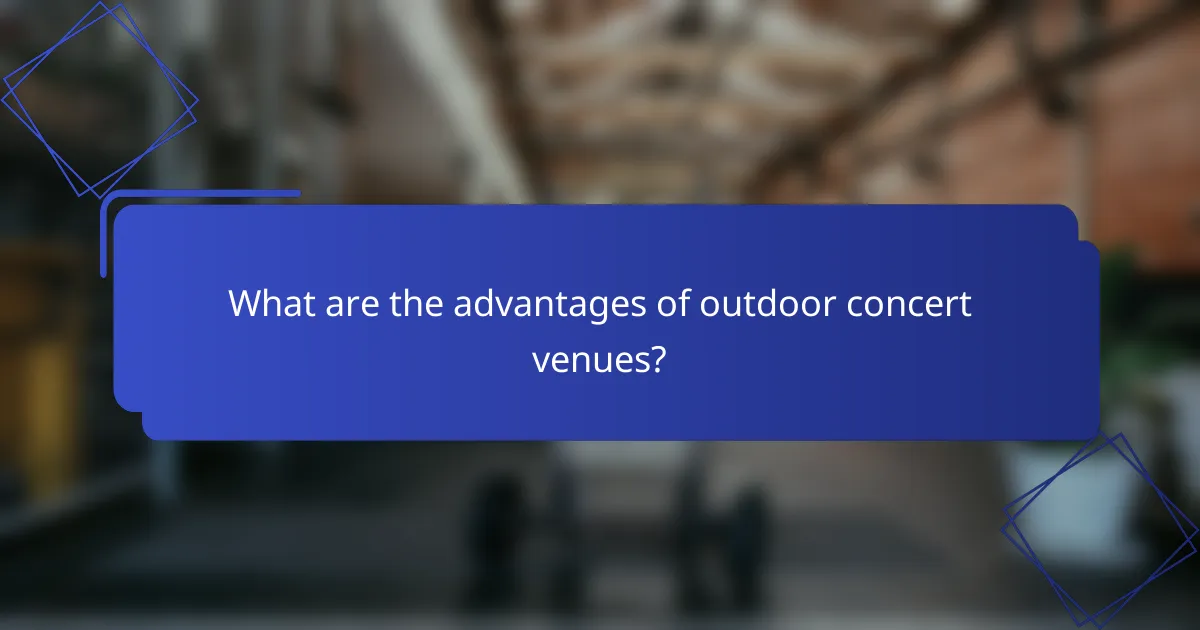
What are the advantages of outdoor concert venues?
Outdoor concert venues offer unique benefits that can enhance the overall experience for both artists and audiences. Key advantages include a natural setting, the ability to accommodate larger crowds, and versatile staging options that can adapt to various performances.
Natural ambiance
Outdoor venues provide a scenic backdrop that can elevate the concert experience. The natural surroundings, such as parks or open fields, contribute to a relaxed atmosphere that indoor venues often lack. This ambiance can enhance the enjoyment of the music and create memorable moments for attendees.
Additionally, outdoor settings allow for the incorporation of elements like sunset views or starry skies, which can add a magical quality to the event. However, it is essential to consider weather conditions, as they can impact the overall experience.
Larger capacity
One of the significant advantages of outdoor concert venues is their ability to host larger audiences. Many outdoor spaces can accommodate thousands of attendees, making them ideal for major music festivals and large-scale events. This capacity can lead to increased ticket sales and revenue opportunities for organizers.
When planning an outdoor concert, it’s crucial to assess the venue’s layout and accessibility to ensure a smooth flow of attendees. Considerations such as parking, restroom facilities, and emergency exits are vital for crowd management and safety.
Flexible staging options
Outdoor venues often allow for more creative staging options compared to their indoor counterparts. Organizers can design stages that take advantage of the open space, incorporating elements like multiple performance areas or unique visual setups. This flexibility can enhance the overall production value of the concert.
Moreover, outdoor venues can accommodate larger sound and lighting systems, which can significantly improve the audience’s experience. However, it is essential to work with experienced production teams to ensure that all technical requirements are met and that the setup adheres to local regulations regarding noise and safety.
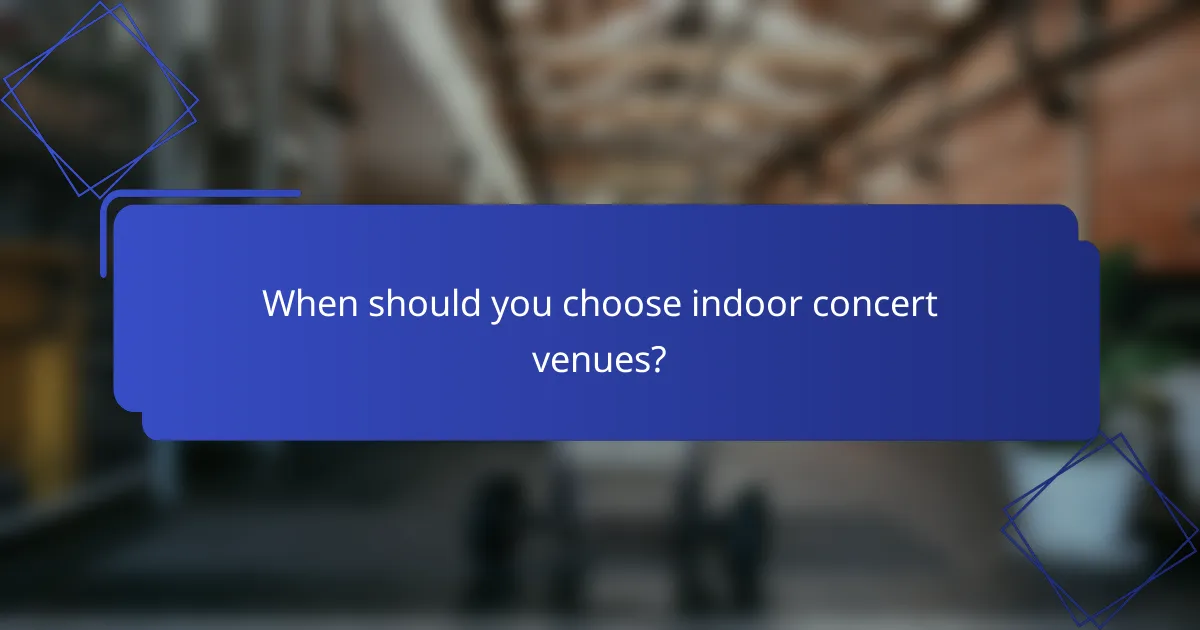
When should you choose indoor concert venues?
Indoor concert venues are ideal when you want to control the environment and enhance the overall experience for both performers and attendees. Factors such as weather, acoustics, and audience size play a significant role in determining when to opt for an indoor setting.
During winter months
Choosing indoor concert venues during winter months is essential for comfort and safety. Cold temperatures and potential snow can deter attendance and affect performance quality. Indoor venues provide a controlled climate, ensuring that both artists and audiences enjoy the event without weather-related disruptions.
Additionally, indoor venues often have heating systems, which can create a cozy atmosphere. This is particularly important for events where prolonged exposure to cold could lead to discomfort or health issues for attendees.
For acoustic-focused performances
Indoor venues are preferable for acoustic-focused performances due to their superior sound control. The enclosed space minimizes outside noise and allows for better sound quality, enhancing the listening experience. This is particularly beneficial for genres such as classical, folk, or acoustic rock, where clarity and nuance are crucial.
Moreover, many indoor venues are designed with acoustics in mind, featuring materials that help to optimize sound distribution. This can significantly elevate the performance, making it more enjoyable for the audience.
For smaller, intimate events
Indoor venues are often better suited for smaller, intimate events where audience interaction is key. These settings foster a closer connection between the performers and the audience, creating a more engaging experience. Venues that accommodate fewer attendees can enhance the atmosphere, making it feel personal and special.
When planning such events, consider venues that offer flexible seating arrangements and good sightlines. This ensures that everyone has a clear view of the stage, further enhancing the intimate vibe of the concert.
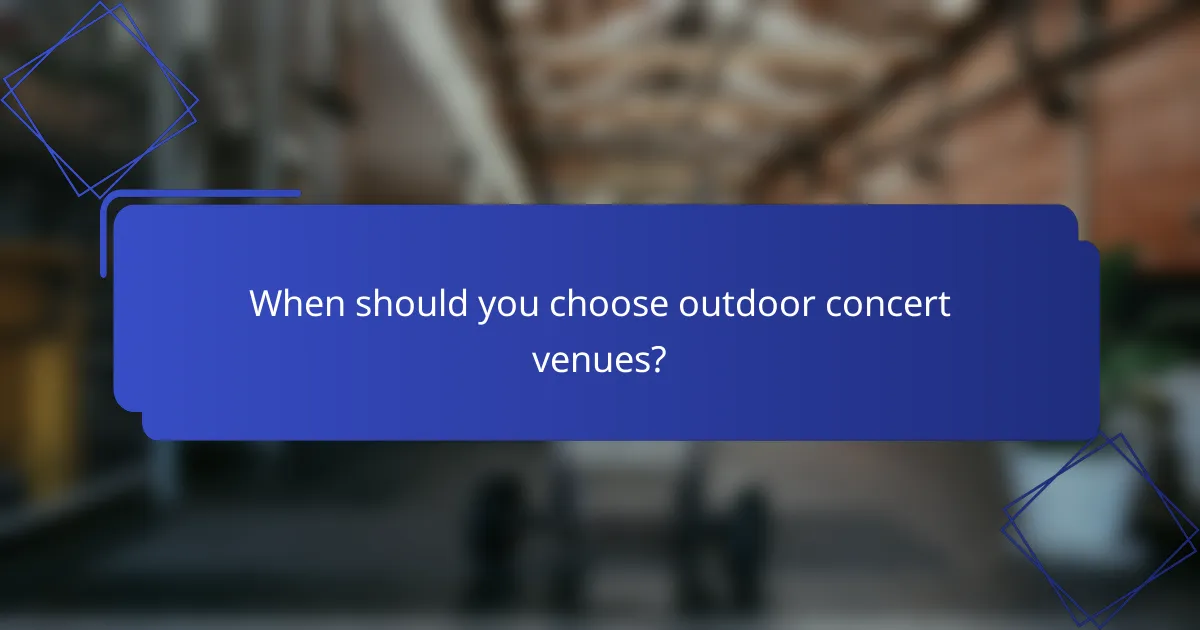
When should you choose outdoor concert venues?
Outdoor concert venues are ideal for events that benefit from natural surroundings and ample space. They are particularly suitable during warm months or for large gatherings where a vibrant atmosphere is desired.
In summer or pleasant weather
Choosing outdoor venues in summer or during pleasant weather enhances the concert experience with fresh air and natural light. Ideal conditions typically include temperatures ranging from 20°C to 30°C, which allow attendees to enjoy the music comfortably.
However, it’s essential to have contingency plans for unexpected weather changes, such as rain or extreme heat. Providing shaded areas, water stations, and rain shelters can significantly improve attendee comfort and safety.
For large festivals
Outdoor venues are often preferred for large festivals due to their capacity to accommodate thousands of attendees. These spaces can provide multiple stages and areas for activities, enhancing the overall festival experience.
When planning a large festival, consider logistics like crowd management, accessibility, and facilities such as restrooms and food vendors. Ensuring adequate parking and transportation options is also crucial for a smooth experience.
For community events
Outdoor venues are excellent for community events as they foster a sense of togetherness and celebration. Parks and open spaces can create a welcoming atmosphere for local gatherings, concerts, and cultural festivals.
When organizing a community event, focus on accessibility and inclusivity. Providing free or low-cost entry can encourage participation, and incorporating local vendors can enhance community engagement while supporting local businesses.
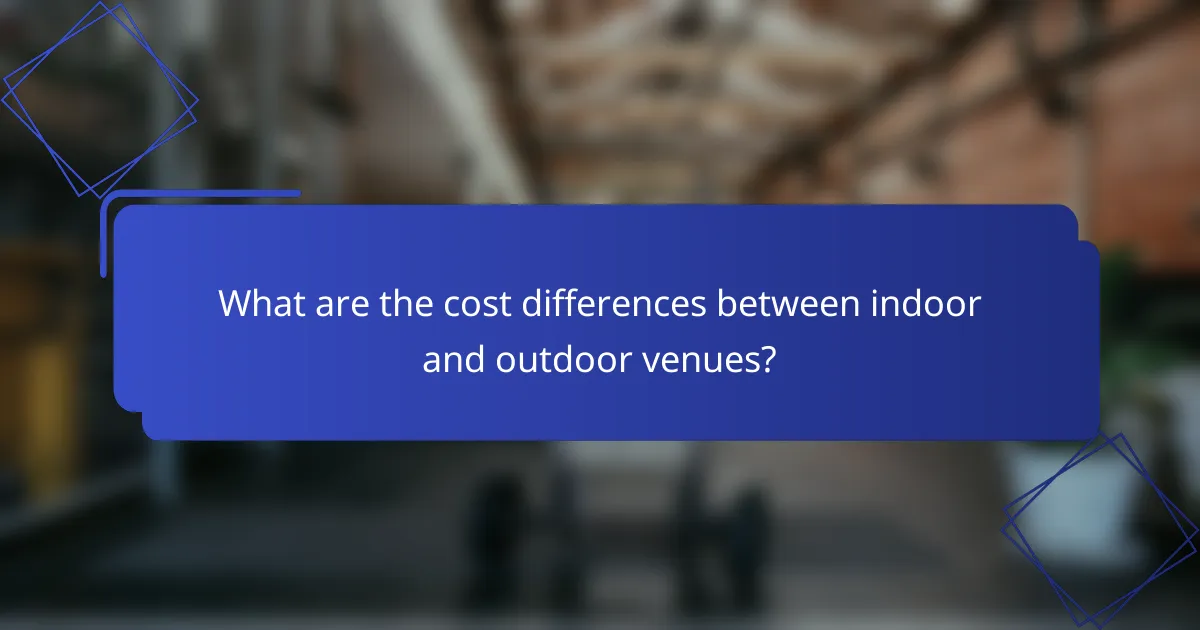
What are the cost differences between indoor and outdoor venues?
The cost differences between indoor and outdoor concert venues can vary significantly based on several factors, including rental fees, setup costs, and insurance. Generally, indoor venues may have higher rental fees but can offer more predictable conditions, while outdoor venues might incur additional expenses related to weather and logistics.
Rental fees
Rental fees for indoor venues typically range from hundreds to thousands of dollars, depending on the location, capacity, and amenities offered. Outdoor venues can be less expensive, especially if they are public spaces, but may require permits that add to the overall cost. Always compare venue options to find the best fit for your budget.
Setup and teardown costs
Setup and teardown costs can differ greatly between indoor and outdoor venues. Indoor venues often have established infrastructure, which can reduce setup time and labor costs. In contrast, outdoor venues may require additional equipment such as tents, stages, and sound systems, leading to higher setup and teardown expenses.
Insurance considerations
Insurance is a crucial factor when planning events at both indoor and outdoor venues. Indoor venues typically have their own insurance policies that cover general liability, while outdoor events often require additional coverage for weather-related issues and potential property damage. It’s essential to consult with an insurance provider to understand the specific requirements for each venue type.

How do audience experiences differ between venue types?
Audience experiences vary significantly between indoor and outdoor concert venues, primarily influenced by factors like sound quality, weather, and overall ambiance. Indoor venues often provide controlled environments, while outdoor settings can enhance the natural atmosphere but introduce unpredictability.
Atmosphere and vibe
Indoor venues typically offer a more intimate atmosphere, with acoustics designed to enhance sound clarity and reduce external noise. The enclosed space can create a sense of closeness between the audience and performers, fostering a unique connection.
In contrast, outdoor venues often capitalize on natural surroundings, which can create a vibrant and expansive vibe. However, factors like weather conditions and ambient noise can affect the overall experience, making it essential to consider the season and location when choosing an outdoor venue.
Accessibility and comfort
Accessibility in indoor venues is generally better, with facilities designed to accommodate various needs, including seating arrangements and restrooms. Many indoor venues comply with regulations to ensure ease of access for all attendees, which can enhance comfort during the event.
Outdoor venues may present challenges, such as uneven terrain or limited seating options. While they can offer more space for larger crowds, attendees should be prepared for potential discomfort from weather elements and the need for portable amenities. Planning ahead with items like sunscreen or rain gear can improve the outdoor concert experience.
